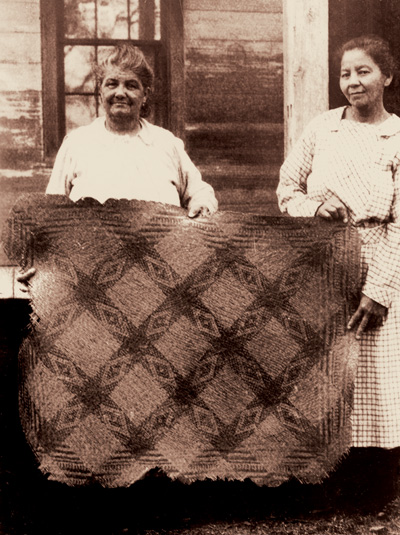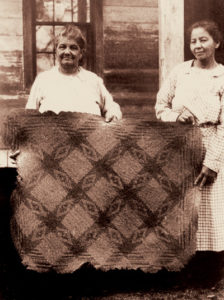Chitimacha Tribe of Louisiana
The Chitimacha Tribe is the only federally recognized tribe in Louisiana to still occupy part of its ancestral territory.
This entry is 6th Grade level View Full Entry

Cammie G. Henry Research Center, Northwestern State University.
Chitimacha weavers Christine and Pauline Paul pose with a rivercane mat made with the Little Trout design.
The Chitimacha Tribe is the only federally recognized Indigenous group to hold onto part of its ancestral territory within the present state of Louisiana. It was the first Louisiana tribe to gain federal recognition in 1916. The tribe has continued to add to its land base through strategic purchases, though the present landholdings represent only a fraction of pre-contact Chitimacha territory. According to their traditional history, Chitimacha ancestral territory extended across the Louisiana coastal region from the Atchafalaya Basin in the west to the lower Mississippi River drainage and New Orleans area in the east. Four sacred trees once stood sentry over the Chitimacha world, marking the boundaries of their territory.
How did initial contact with Europeans affect the Chitimachas?
Contact between Europeans and Chitimachas may have happened as early as the sixteenth century, when survivors of Spanish expeditions traveled down the Louisiana coastline on their way to Mexico. Today Chitimacha families still tell stories of conquistadors in seafaring vessels who tried unsuccessfully to capture and enslave Chitimachas. After the French established a colony on the Gulf Coast, Chitimachas went to war against France when French entrepreneurs began to raid Chitimacha villages, taking captives and selling them to settlers. Renowned basket weaver Pauline Paul recalled this dark time through stories of Chitimacha ancestors who suffered years of bondage in the French colony. The twelve-year war ended by treaty in 1718 only when the Chitimachas agreed to abandon their territory on the lower Mississippi River, just as construction of the new capital of New Orleans began.
Having made peace, Chitimachas joined with other Native nations as participants in the growing colonial economy in New Orleans, exchanging goods like wild game, edible and medicinal plants, deerskins, bear oil, and salt for European goods. At about the same time, Chitimacha women began to trade and sell their signature split-rivercane baskets in New Orleans and local markets.
How did Spanish possession of Louisiana affect the Chitimacha?
By the time Spain took possession of Louisiana in 1766, it had been almost fifty years since the Chitimachas’ war with France. Spanish administrators treated the Chitimachas as a sovereign nation having the right to self-governance and authority over its remaining lands. Chitimachas began to sell or lease plots of ancestral land, but Spanish law ensured at least one square league (roughly 2.6 square miles) of land around each village remained untouchable.
Why is the tradition of basketry important to Chitimacha culture?
While their political power and security declined in the nineteenth century, Chitimacha basketry remained a mainstay of tribal identity and the tribal economy. Basketry designs reflect the natural world of early weavers, who first captured their impressions in cane. The names of those designs were considered so important that they were among the only relics of the Sitimaxa language preserved in the community by the early 1900s. By the late nineteenth century, Chitimacha weavers formed a working relationship with women from the tabasco pepper–growing McIlhenny family, extending the market for their baskets throughout North America.
Today the tribe continues to support its ancient basketry tradition and was the first Louisiana tribe to regrow stands of rivercane on tribal property, making this vital material available to weavers. With tribal support weavers have identified and examined approximately one thousand Chitimacha baskets housed in museums nationwide. The once-endangered Sitimaxa language has undergone revival. Sitimaxa is a part of the curriculum at the Tribal School and Learning Center in Jeanerette, Louisiana, and Rosetta Stone’s landmark endangered language project makes software language instruction available to all Chitimacha tribal members. Deeply rooted in the traditional past, the Chitimacha Tribe of Louisiana continues its work to ensure a promising cultural and economic future for Chitimacha people.
